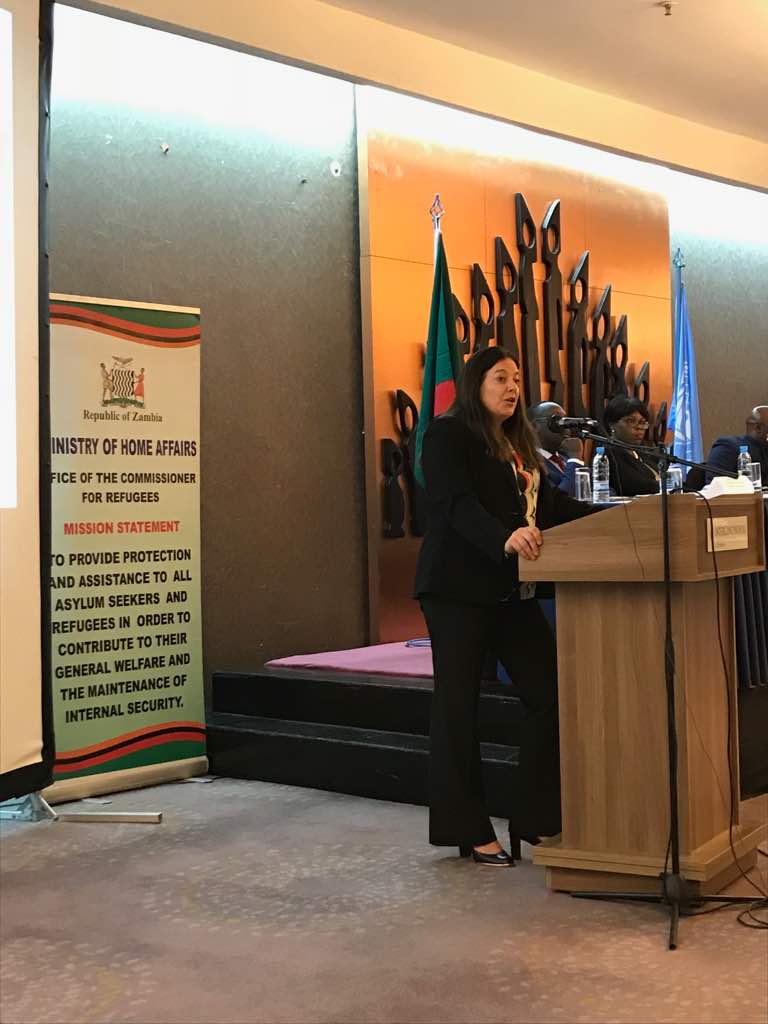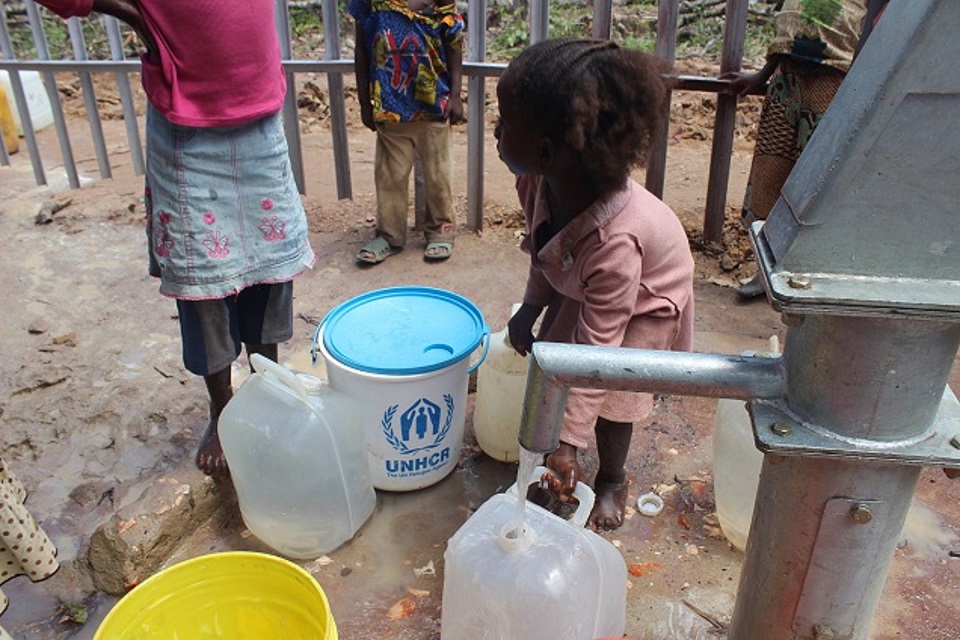Launch of the Zambia Country Chapter of the Regional Refugee Response Plan for the DRC situation
Notice: Undefined index: catFilterList in /home/zambi/public_html/wp-content/plugins/wp-likes/api.php on line 243
VENUE: Intercontinental Hotel, Lusaka, Zambia
Remarks of UNHCR Representative Ms. Pierrine Aylara given by OIC Ms. Giulia Ricciarelli-Ranawat
The Minister of Home Affairs, Honorable Stephen Kampyongo (MP)
The Permanent Secretary in the Ministry of Home Affairs, Ms. Pamela Kabamba
The Commissioner for Refugees, Mr. Abdon Mawere
Ambassadors and Members of the Diplomatic Corps
Senior Government Officials
The UN Resident Coordinator, Ms. Janet Rogan and colleagues from the United Nations
Invited Ladies and gentlemen
Thank you for joining us at the Zambia country chapter launch of the Regional Refugee Response Plan for the Democratic Republic of Congo situation.
We are gathered here today to draw attention to the plight of refugees fleeing to Zambia from the unfolding conflict in the DRC and the collective efforts of the Government of the Republic of Zambia, UNHCR, UN agencies, NGOs and other partners to respond to their life-saving needs. To date, conflict in a number of regions in the DRC has led to over 20,718 Congolese seeking international protection and refuge in Zambia since January last year. Currently, Zambia hosts over 42,468 Congolese refugees and asylum seekers and projections foresee that this number may increase to 76,000 by the end of the year.
As the security conditions in the Kasai and Tanganyika Provinces as well as other regions deteriorate, many more Congolese refugees may continue to seek international protection in neighboring countries, including Zambia.
Many of the refugees who have fled the conflict in DRC suffer from physical injuries and violence. As already mentioned in the previous presentation, over three quarters of the refugees who have fled to Zambia are women and children. During the biometric registration exercise conducted by the Government of Zambia with support from UNHCR, many refugees were identified with specific protection needs, including single parents, separated and unaccompanied children and other children at risk, persons living with disabilities and elderly refugees; women and young people who are victims, or at risk of sexual violence, exploitation and HIV infection.
Honorable Excellencies, ladies and gentlemen,
The joint financial requirements of over 74 million dollars in this chapter of the Regional Refugee Response Plan for the DRC presented here today, are for 16 partners, both UN agencies and NGOs, to enable them to jointly respond to the urgent humanitarian needs of the Congolese refugees and their host communities in Zambia. These needs are urgent and across sectors; they include international protection, food, water and sanitation, nutrition, shelter, health, relief items and accommodation in conditions that meet humanitarian standards.
With overall coordination and leadership from the Office of the Commissioner for Refugees and UNHCR, the multi-sectoral response of sister UN agencies and NGO partners aims to ensure protection for all refugees and access to life saving assistance and quality basic services, so that the refugees can become self-sufficient during their time in exile and lead their lives with dignity. Similarly, and in the spirit of the Comprehensive Refugee Response Framework (CRRF), joint efforts of the humanitarian and development actors, from Government to UN Agencies and NGO partners and hopefully private sector in the future, will ensure that some of the services such as schools and health posts will in equal manner benefit the local communities hosting refugees, ensuring that development interventions are implemented early on in this emergency response. UNHCR, UN Agencies and NGOs have, and will continue to work together in partnership and in close coordination with the Government and local authorities, to ensure that the needs of the refugees are met.
Excellencies, ladies and gentlemen,
The Government and the people of Zambia have generously responded to the plight of Congolese refugees and many other thousands of refugees before them, offering international protection, safety and the opportunity to continue to build their lives in peaceful coexistence with Zambians. They have shown solidarity, generosity and hospitality.
On behalf of the High Commissioner for Refugees, Mr. Filippo Grandi, allow me to express once again, heartfelt gratitude to the Government of Zambia for keeping its borders open and hosting refugees fleeing the violent conflict in DRC, as well as refugees from the region and beyond. Signatory to the 1951 Refugee Convention, the Government of Zambia and the local authorities in refugee hosting districts have extended commendable support to the refugees and excellent collaboration to the agencies responding on the ground, for which we are truly grateful.
The Government of Zambia, has also allocated land in Nchelenge district in Luapula province so that refugees can live there, alongside their host communities. UNHCR, UN agencies and NGO partners are currently working together with the Zambian authorities to develop a new refugee settlement, Mantapala, into a suitable site to host the refugees. Over 5,100 refugees have already been relocated from Kenani Transit Centre, a temporary reception facility for new arrivals, to Mantapala and another relocation is ongoing today as we speak. After the inter-ministerial steering committee visit to the site, spearheaded by the Honorable Minister of Home Affairs last week, it was to my awe to see how far Mantapala settlement has come developed in the last few month, since its opening earlier this year. I was happy to see businesses running, children playing in the child friendly spaces, and infrastructure such as schools and health clinics being developed and used by Zambians from the host communities alongside refugees relocated to Mantapala.
 While the larger numbers of new arrivals from the DRC have entered through the borders in Luapula province, several thousands have also arrived in other provinces of Zambia, notably the North Western province and have been received and hosted in the already established Meheba refugee settlement. The Zambia chapter of the RRRP intends to cover the country wide needs for a comprehensive refugee response for Congolese refugees in Zambia and includes identified gaps for a dignified reception of new refugees in Meheba and elsewhere as well.
While the larger numbers of new arrivals from the DRC have entered through the borders in Luapula province, several thousands have also arrived in other provinces of Zambia, notably the North Western province and have been received and hosted in the already established Meheba refugee settlement. The Zambia chapter of the RRRP intends to cover the country wide needs for a comprehensive refugee response for Congolese refugees in Zambia and includes identified gaps for a dignified reception of new refugees in Meheba and elsewhere as well.
Allow me to also express my sincere gratitude to the Resident Coordinator, the UN system in Zambia and the NGO community present here, who have all come together to deliver this collective and joint effort for refugees and their hosts, in support of the Government of Zambia.
Let me end by saying, refugees are people like you or me, they are mothers, fathers, sisters and brothers who have faced painful losses, tremendous fear, and lived through the horrors of war, conflict and persecution. The combination of new emergencies and old conflicts places an enormous stress on host governments and communities, and on UNHCR and its partners. As media attention is focused elsewhere, Africa suffers disproportionately more than other regions as both financial and human resources are painfully insufficient to meet the needs.
I appeal to you for your traditional generosity and support so that refugees in Zambia can be protected, assisted and that our actions can help them rebuild their lives and restore hope.
Thank you.





















